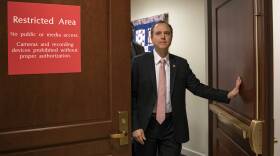EXPLORE MORE
Coming up Wednesday on BPR:
Harvard national security expert Juliette Kayyem
ACLU of Massachusetts' Carol Rose
Brockton schools superintendent Priya Tahiliani
Recent segments
-
Ali Noorani Weighs In On The Future of DACA
The National Immigrant Forum executive director said the court's decision is likely to impact millions. -
Joan Baez And Betsy Siggins On Decades Of Folk Music And Activism At Club Passim
Club Passim is celebrating 60 years on the scene. -
Paul Reville: As Higher Education Costs Skyrocket, The 4-Year College Model Is 'Breaking Down'
As the cost of a four-year liberal arts education is set to hit $100,000 at some institutions, less and less people are graduating through that model. -
Montana Gov. Steve Bullock Says He's Prepared To Tackle Dysfunction In Washington
On Tuesday, Bullock joined Boston Public Radio to discuss the state of his presidential campaign. -
Marika Aubrey Talks 'Come From Away'
The Australian actor discussed the Tony-winning musical currently showing in Boston. -
John King: Opening Hours Of Public Impeachment Hearings Are Critical For Democrats
Democrats will conduct the first public impeachment hearings on Wednesday.
Listen to previous shows
-

BPR Full Show: Old Cape Cod
Today on Boston Public Radio: We begin the show by opening phone lines, talking with listeners about last night’s Jan. 6 hearing. Devra First and Christopher Muther join us to share their list of hidden gems on Cape Cod. First writes about food and reviews restaurants for the Boston Globe. Muther is a travel writer for the Boston Globe. Shirley Leung discusses efforts to protect abortion rights in Mass., and the state of the MBTA in the wake of the Orange line train fire over the Mystic River on Thursday. Leung is a business columnist for the Boston Globe. Bill McKibben talks about his recent book, “The Flag, the Cross, and the Station Wagon: A Graying American Looks Back at His Suburban Boyhood and Wonders What the Hell Happened." He also shares his thoughts on heat waves across the U.S. and Europe. McKibben is an author, educator and environmentalist. He’s the founder of 350.org and ThirdAct.org. He has a new newsletter on Substack titled “The Crucial Years.” He’s also got a new, serialized book titled “The Other Cheek: An Epic Nonviolent Yarn.” Andy Ihnatko updates us on the latest tech headlines, focusing on the publishing industry’s lawsuit against the Internet Archive. Ihnatko is a tech writer and blogger, posting at Ihnatko.com. David Ibbett and James Monroe talks about translating the science of black holes into song through the Black Hole Symphony. Cellist Johnny Mok, soprano Agnes Coakley-Cox, and flutist and piccolo player Jessica Smith perform. Ibbett is the founder of the Multiverse Concert Series, and composer of the Black Hole Symphony. Monroe is the Senior Producer Adult Programs & Theater Experiences at the Museum of Science. We then ask listeners to share their favorite places to visit on Cape Cod. -

BPR Full Show: "Ask the Governor," Tanglewood, and more
Today on Boston Public Radio: We begin the show by asking listeners about the case for former President Donald Trump’s prosecution following the Jan. 6 hearings. Then, we re-air a segment with Lee Feinberg and Terri Randall about the NOVA documentary “Ultimate Space Telescope,” and the James Webb Space Telescope. Andrea Cabral shares her thoughts on the upcoming Jan. 6 hearing, as well as Steve Bannon's contempt of Congress trial and the Biden administration’s response to the Supreme Court’s Dobbs decision. Cabral is the former Suffolk County sheriff and secretary of public safety, and former CEO of the cannabis company Ascend. Gov. Charlie Baker joins us to talk about the state of the MBTA, the future of abortion access, and his plan to tackle the housing crisis. He also answered listeners’ questions and calls during “Ask the Governor.” Baker is Governor of Massachusetts. Andris Nelsons discusses the way COVID-19 has impacted musicians, the reemergence of vocal performances at Tanglewood, and his upcoming summer concerts with the Boston Symphony Orchestra. Nelsons is Music Director of the Boston Symphony Orchestra and the Leipzig Gewandhaus Orchestra. -

BPR Full Show: No Shirts, No Shoes, No Service
Today on Boston Public Radio: We begin the show by asking listeners how they’re coping with the heat in Boston. Juliette Kayyem discusses record-breaking heat across Europe, and the Secret Service reportedly turning over just one text to the Jan. 6 panel. Kayyem is an analyst for CNN, former assistant secretary at the Department of Homeland Security and faculty chair of the Homeland Security program at Harvard University’s Kennedy School of Government. Boston City Councilor Ricardo Arroyo weighs in on the Boston Police Department’s response to the Patriot Front march through downtown Boston in early July. He also shares his thoughts on Boston’s new police commissioner, Michael Cox. Paul Reville talks about Education Commissioner Jeff Riley’s proposal to raise the passing score needed for 10th grade MCAS tests. Reville is the former secretary of education and a professor at Harvard University’s Graduate School of Education, where he also runs the Education Redesign Lab. His latest book, co-authored with Lynne Sacks, is “Collaborative Action for Equity and Opportunity: A Practical Guide for School and Community Leaders.” Art Caplan shares his thoughts on the doctor who performed an abortion for a 10-year-old rape victim from Ohio taking the first legal step against Indiana Attorney General Todd Rokita in a potential defamation case. Caplan is the Drs. William F. and Virginia Connolly Mitty Professor and founding head of the Division of Medical Ethics at NYU School of Medicine in New York City. Sy Montgomery talks about black bears breaking into New Hampshire homes, and explains how to keep pets safe and cool during heat waves. Montgomery is a journalist, naturalist and BPR contributor. Her latest book is "The Hawk’s Way: Encounters with Fierce Beauty.” We end the show by talking with listeners about their summer office attire. -

BPR Full Show: Emerald Tutus
Today on Boston Public Radio: Sen. Ed Markey discusses the future of climate legislation in Congress, and calls for reforming the Supreme Court and abolishing the filibuster. Then, we open the phone lines, asking listeners if it’s time to expand the Supreme Court. Prof. Julia Hopkins explains the focus of her “Emerald Tutu” project, which would create a skirt of floating greenery along the most vulnerable parts of Boston’s shore. Hopkins is an assistant professor of Civil and Environmental Engineering at Northeastern University, and on a team of researchers hoping to install an “Emerald Tutu” along the city’s coast. Ryan Landry shares his current projects, from recent paintings to upcoming performances. Landry is a playwright, actor, songwriter, painter and canned tomato influencer. Adam Conover joins us ahead of his upcoming performances at Laugh Boston to talk about his new Netflix show “The G Word with Adam Conover” and reflect on the end of “Adam Ruins Everything.” Conover is a self-described investigative comedian. Sue O’Connell talks about obstacles to gender equity in the workplace. O’Connell is the co-publisher of Bay Windows and South End News, and contributor to Current, on NBC L-X and NECN. We end the show by asking listeners if they’ve ever napped at work. -

Corby Kummer: Making the Mocha Connection
Westford-based group Mocha Connection is partnering with farmers in Yemen to bring back the country’s status as a significant global supplier of coffee beans. Yemen, which has been engaged in a civil war for nearly a decade, is known for its distinct, chocolatey coffee beans that grow well in the country’s rich soil. In fact, mocha gets its name from Yemen’s port city Mocha, which is widely regarded as the birthplace of the coffee trade. “Four locally-based Yemeni natives are managing to get [coffee beans] out of Yemen, and are exporting coffee right here,” award-winning food writer Corby Kummer told Boston Public Radio. “I am so excited about it — I'm immediately going to mail order it.” Kummer is executive director of the food and society policy program at the Aspen Institute, a senior editor at The Atlantic and a senior lecturer at the Tufts Friedman School of Nutrition Science and Policy.








